Biology Postcards
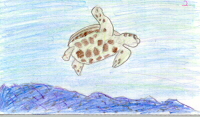 The green sea turtle spends almost its entire life in the sea. They eat grass and algae. After hatching, only one or two turtles out of a hundred survive their first year.
The green sea turtle is endangered in Florida and Mexico. It is threatened with extinction elsewhere.
The green sea turtle spends almost its entire life in the sea. They eat grass and algae. After hatching, only one or two turtles out of a hundred survive their first year.
The green sea turtle is endangered in Florida and Mexico. It is threatened with extinction elsewhere.
by Rachael
More information about sea turtles can be found at Turtle Trax - A Sea Turtle Page
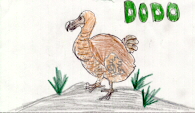 The dodo bird was a bird that lived hundreds of years ago. It was common on the Island of Mauritius. This bird was unable to fly. The birds were killed by settlers and their dogs.
The dodo bird was a bird that lived hundreds of years ago. It was common on the Island of Mauritius. This bird was unable to fly. The birds were killed by settlers and their dogs.
by Drew
More information on the dodo and other extinct animals can be found at Extinct Species Tour List
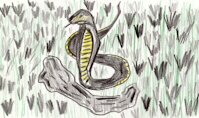 There are many, many different types of snakes that live in the world today. These snakes can either be venomous or non-venomous, they can be large or they can be small,
some snakes can be the size of small worms, while some snakes, like the pythons, can grow to be 10 meters long! Some snakes kill their prey with their venom, and other snakes kill their prey in other ways. Because of snakes'
venom many people have grown to fear snakes, but the truth is that snakes are happier staying away from humans.
There are many, many different types of snakes that live in the world today. These snakes can either be venomous or non-venomous, they can be large or they can be small,
some snakes can be the size of small worms, while some snakes, like the pythons, can grow to be 10 meters long! Some snakes kill their prey with their venom, and other snakes kill their prey in other ways. Because of snakes'
venom many people have grown to fear snakes, but the truth is that snakes are happier staying away from humans.
by Ben
More information about snakes can be found at Slither
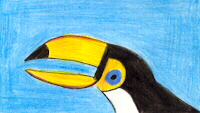 Toucans live in the tropical rain forests of South America. The Toco Toucan is the largest kind of toucan. Its huge bill may look heavy, but it's really very light because it's hollow.
Toucans live in the tropical rain forests of South America. The Toco Toucan is the largest kind of toucan. Its huge bill may look heavy, but it's really very light because it's hollow.
by Sarah
More information about birds can be found at The Aviary
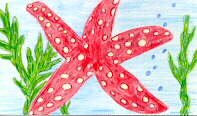 Starfish facts:
Starfish facts:
*They eat animals like clams and scallops. They use their tube feet to pry the shells open.
*When a starfish is broken apart it can regrow its body.
by Anna
More information about starfish can be found at Phylum Echinodermata
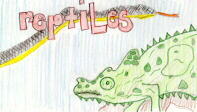 Reptiles are vertebrates that have lungs and scaly skin. Lizards, snakes, turtles, and crocodiles are all reptiles. They have shelled eggs that enable them to live a life on land,
along with their dry scaly skin that must be shed periodically because it does not grow with the animal.
Reptiles are vertebrates that have lungs and scaly skin. Lizards, snakes, turtles, and crocodiles are all reptiles. They have shelled eggs that enable them to live a life on land,
along with their dry scaly skin that must be shed periodically because it does not grow with the animal.
by Alicia
More information about reptiles can be found at Class Reptilia
Click here to go to Page 1
Click here to go to Page 2
Click here to go to Mrs. N. Spires Biology Page
This page hosted by  Get your own Free Home Page
Get your own Free Home Page
 The green sea turtle spends almost its entire life in the sea. They eat grass and algae. After hatching, only one or two turtles out of a hundred survive their first year.
The green sea turtle is endangered in Florida and Mexico. It is threatened with extinction elsewhere.
The green sea turtle spends almost its entire life in the sea. They eat grass and algae. After hatching, only one or two turtles out of a hundred survive their first year.
The green sea turtle is endangered in Florida and Mexico. It is threatened with extinction elsewhere. The dodo bird was a bird that lived hundreds of years ago. It was common on the Island of Mauritius. This bird was unable to fly. The birds were killed by settlers and their dogs.
The dodo bird was a bird that lived hundreds of years ago. It was common on the Island of Mauritius. This bird was unable to fly. The birds were killed by settlers and their dogs. There are many, many different types of snakes that live in the world today. These snakes can either be venomous or non-venomous, they can be large or they can be small,
some snakes can be the size of small worms, while some snakes, like the pythons, can grow to be 10 meters long! Some snakes kill their prey with their venom, and other snakes kill their prey in other ways. Because of snakes'
venom many people have grown to fear snakes, but the truth is that snakes are happier staying away from humans.
There are many, many different types of snakes that live in the world today. These snakes can either be venomous or non-venomous, they can be large or they can be small,
some snakes can be the size of small worms, while some snakes, like the pythons, can grow to be 10 meters long! Some snakes kill their prey with their venom, and other snakes kill their prey in other ways. Because of snakes'
venom many people have grown to fear snakes, but the truth is that snakes are happier staying away from humans. Toucans live in the tropical rain forests of South America. The Toco Toucan is the largest kind of toucan. Its huge bill may look heavy, but it's really very light because it's hollow.
Toucans live in the tropical rain forests of South America. The Toco Toucan is the largest kind of toucan. Its huge bill may look heavy, but it's really very light because it's hollow. Starfish facts:
Starfish facts: Reptiles are vertebrates that have lungs and scaly skin. Lizards, snakes, turtles, and crocodiles are all reptiles. They have shelled eggs that enable them to live a life on land,
along with their dry scaly skin that must be shed periodically because it does not grow with the animal.
Reptiles are vertebrates that have lungs and scaly skin. Lizards, snakes, turtles, and crocodiles are all reptiles. They have shelled eggs that enable them to live a life on land,
along with their dry scaly skin that must be shed periodically because it does not grow with the animal.